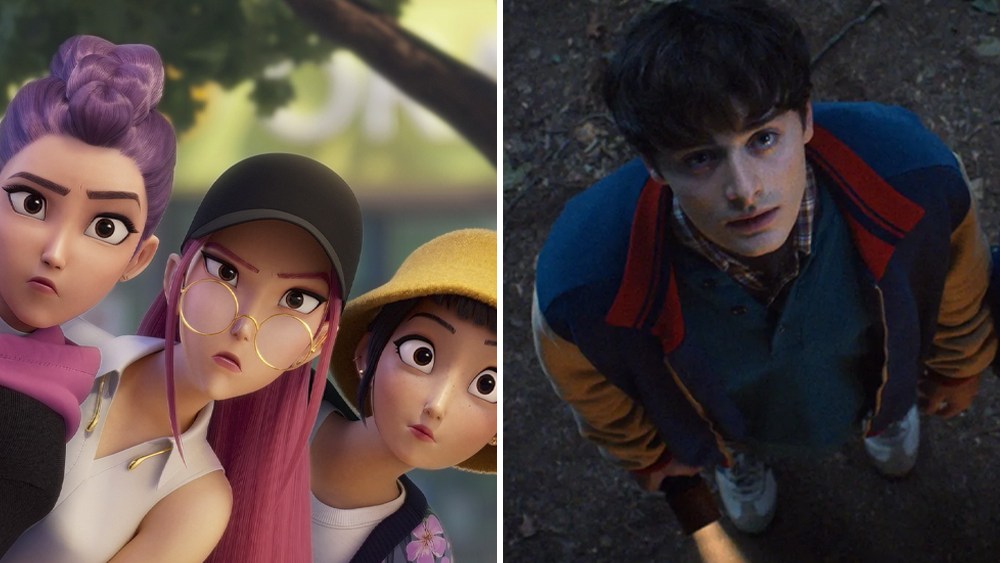
Why Netflix, AMC Theatres Are Teaming on Stranger Things, Kpop Demon Hunters
Are AMC Theatres and Netflix finally burying the hatchet?
It sure seems that way after AMC agreed to book “KPop Demon Hunters” in 300 venues as Netflix re-releases the animated musical smash over Halloween weekend. AMC Theatres, the world’s largest cinema chain, typically refuses to schedule movies from Netflix, the biggest streaming service, because the two companies don’t agree on the length of time a film should remain exclusively on the big screen.
“For a long time, Netflix’s primary interest in getting its movies into theaters was for awards consideration or appeasing talent,” says analyst Alicia Reese, VP of equity research at Wedbush Securities. “Netflix has more interest now in trying to maximize reach.”
And who is AMC to deny a hit? With box office revenues 20% behind COVID times, no movie theater is positioned to turn down a crowd-pleaser. AMC was the only major exhibitor not to play “KPop Demon Hunters” when Netflix brought a sing-along version of its most popular film ever to cinemas in August. In a box office twist, the movie was No. 1 for the weekend with roughly $18 million.
For years, AMC hasn’t shown interest in getting serious with Netflix even though the theater circuit has desperately needed more movies to show. Only one Netflix release, Rian Johnson’s 2022 “Knives Out” sequel “Glass Onion,” has played at AMC. Recently, AMC sounded a more conciliatory note, releasing a statement saying that both companies are “intrigued by the mutually beneficial opportunities that could arise.” Since then, Netflix also has arranged for the two-hour “Stranger Things” finale to debut in AMC theaters and other locations on New Year’s Eve and New Year’s Day as the episode simultaneously drops on the streamer.
Netflix appears to be warming to the big screen, which outsiders attribute to either a belated recognition that theatrical movies tend to have more cultural staying power or a reaction to losing projects like Emerald Fennell’s “Wuthering Heights” to Warner Bros. or talent including the Duffer Brothers to Paramount.
Unlike major studios, however, Netflix sees multiplexes not as a financial strategy but rather a marketing stunt to excite the fandoms of its major properties, with the goal of driving interest back to the platform. By enlisting AMC locations, Netflix will be able to expand the reach of its theatrical content. For AMC, these one-off events could provide additional revenue during slower times of the year.
Other ideas have been percolating since AMC and Netflix agreed to be cordial. Greta Gerwig’s 2026 “Narnia” adaptation, which is already getting a two-week exclusive Imax run in AMC and other venues, could get a release on screens beyond the premium format. Netflix is also contemplating a more robust rollout for David Fincher’s “Adventures of Cliff Booth,” the Brad Pitt-led spinoff of Quentin Tarantino’s 2019 box office hit “Once Upon a Time in Hollywood.” Because the “Narnia” reboot is slated for next November and “Cliff Booth” is eyeing a summer 2026 launch, theatrical plans won’t be finalized until closer to either film’s release.
Not every commercial property will enjoy a big-screen boost. “Wake Up Dead Man: A Knives Out Mystery” will get only an awards qualifying run because plans couldn’t come together for a larger rollout.
Earlier in the year, Netflix CEO Ted Sarandos dismissed the communal experience of watching a movie in cinemas as an “outmoded idea.” And last week, he reiterated that “our strategy is to give our members exclusive first-run movies on Netflix.”
So exhibitors don’t expect a full-throated embrace of the big screen à la Amazon MGM, which has committed to release 15 theatrical films annually. Netflix already puts awards contenders in select theaters for an Oscar-qualifying run. Anything past that will revolve around promotional efforts tied to properties with built-in fan bases.
“Netflix isn’t going to announce a theatrical slate but will be selective when they have something special, which is what everyone wanted,” predicts one theater owner.
Since Netflix movies aren’t getting traditional releases, exhibitors are granted more favorable terms as incentives to play them. Netflix has been lenient in other ways. Major distributors often require theater chains to schedule new releases from dawn until dusk. But Netflix told exhibitors to play “KPop Demon Hunters” as they please.
Hollywood studios welcome Netflix’s acknowledgment of theatrical as long as the streamer doesn’t step on their toes — whether by hogging the coveted premium large formats or scheduling its programming on prime release dates.
“We’re there for exhibition 52 weeks a year,” says one studio executive. “We don’t want to take a back seat to Netflix.”
First Appeared on
Source link






